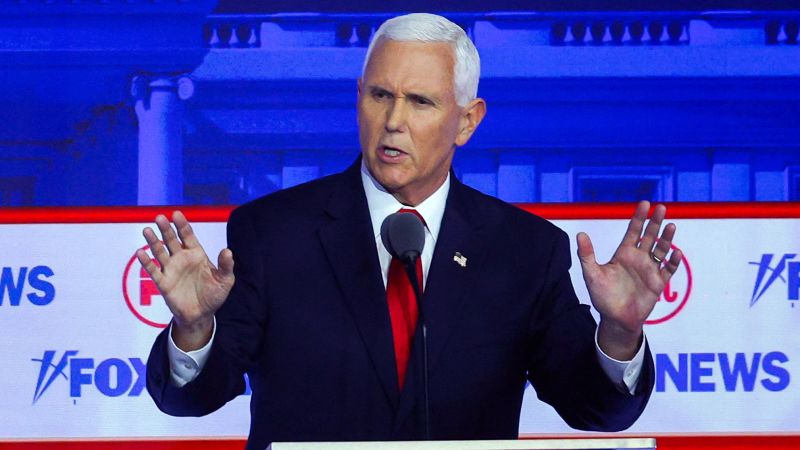Former Vice President Mike Pence has suspended his campaign for president amid lagging poll numbers and financial challenges, vowing to help elect “principled Republican leaders” moving forward.
“After much prayer and deliberation, I have decided to suspend my campaign for president effective today,” Pence said at the Republican Jewish Coalition’s annual conference in Las Vegas on Saturday.
There was major concern in Pence’s campaign that he wasn’t going to qualify for the third debate stage next month, one source told CNN. That concern was a driving factor in Pence’s decision, a Republican adviser close to his campaign said, and several days of fundraising this week did little to alleviate that.
“There just weren’t enough donors,” the Republican adviser said.
“I’m leaving this campaign, but let me promise you, I will never leave the fight for conservative values and I will never stop fighting to elect principled Republican leaders to every office in the land. So help me God,” Pence said Saturday.
The decision to suspend was kept a close hold among advisers, multiple sources told CNN. Many event planners were unaware that the announcement would be made on stage.
Pence’s theory of his candidacy was simple – he broke with his former boss Donald Trump over the January 6, 2021, attack on the US Capitol and refocused on the core conservative principles that founded the modern Republican Party with Ronald Reagan, his political beacon.
Pence returned to that idea throughout the campaign, from campaign signs intentionally harking back to Reagan’s 1984 campaign to speeches urging his party to turn away from populism.
His exit from the 2024 race is another indication that today’s GOP has long left that kind of conservatism he represents, reshaped by Trump. Trump continues to be the dominant candidate in the 2024 GOP presidential race, despite his legal troubles.
Pence, who was Indiana governor and a US congressman before becoming vice president, announced his campaign in early June. He chose to launch his bid in Iowa, rather than his home state of Indiana, a sign of how much importance he was placing on the early-voting state.
He vowed to visit all of Iowa’s 99 counties, focusing on face-to-face interactions in intimate settings. As an evangelical Christian, the Midwestern native leaned on his faith and courted fellow conservative evangelicals, a crucial voting bloc in the state.
Amid a crowded field, Pence was in the unique position of having served as vice president to Trump, the man he was in turn competing against for the GOP nomination this election cycle.
Pence would often say he was proud of the Trump-Pence administration’s accomplishments, but he tried making the case that Trump wasn’t running this election on the same conservative principles they governed on together.
He drew a contrast between him and his former ticket mate over their stances on Social Security, abortion restrictions and foreign policy – mainly US support for Ukraine in its war against Russia. In a speech in early September, Pence warned of what he called the “siren song of populism” from Trump and his “imitators.”
But what loomed large was the infamous day of January 6, 2021, when Pence broke with his boss in refusing to reject electoral votes during Congress’ certification of the 2020 election.
Pence’s role as vice president was ceremonial in overseeing the process, but Trump and his supporters still felt Pence could intervene.
“What I want the American people to know is that President Trump was wrong then and he’s wrong now that I had no right to overturn the election. I had no right to reject or return votes, and that, by God’s grace, I did my duty under the Constitution of the United States,” Pence told CNN in August – a phrase of some variation that he’d repeat on the campaign trail.
While stumping for president, Pence was sometimes thanked for his service in the administration, his devotion to his Christian faith or for his actions on January 6. But the admiration for the former vice president did not translate to support in the polls.
Pence participated in the first two GOP primary presidential debates. While he easily met the polling qualifications to be on the debate stages, he faced more of a challenge meeting the individual donor threshold set by the Republican National Committee.
More signs of a campaign in trouble came in October, when Pence filed for the state-run Nevada presidential primary rather than the party-run caucuses, which have a $55,000 filing fee.
The move made him ineligible for Nevada’s allocation of delegates to next year’s GOP convention. His campaign also reported $620,000 in debt in the third fundraising quarter, calling into question the longevity of his candidacy.
Despite his criticism of his Republican rivals, Pence had vowed to back the eventual GOP nominee. He previously shot down the idea of being a vice presidential nominee again, saying that running twice for the position was enough.
This story has been updated with additional information.
Read the full article here





